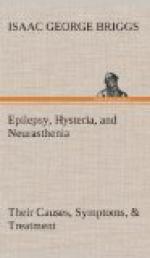In a major attack, show no sympathy. Let every one leave the room, save one attendant, whom the victim knows to be of firm character, and calm but determined disposition. This attendant should get a jug of water, and threaten to douche the victim unless she makes vigorous efforts to control herself. If she cannot, or will not, douche her, then hold a towel over her nose and mouth, and she will perforce cease her gymnastics to breathe, though the attendant must be prepared for an outburst of abuse when she has recovered her breath. Between attacks, all who are brought into contact with the victim, must adopt a tolerant but unsympathetic attitude, while efforts are made to inculcate habits of control.
* * * * *
CHAPTER IX
ADVICE TO NEUROPATHS
“Great temperance, open air,
Easy labour, little care.”
The above quotation epitomizes the cure for neurasthenia, for as Huxley said:
“Our life, fortune, and happiness depend on our knowing something of the rules of a game far more complicated than chess, which has been played since Creation; every man, woman and child of us being one of the players in a game of our own. The board is the world, the pieces the phenomena of the universe, while the rules of the game are the laws of nature. Though our opponent is hidden, we know his play is fair, just and patient, but we also know to our sorrow that he never overlooks a mistake or makes the slightest allowance for ignorance. To the man who plays well, the highest stakes are paid with that overflowing generosity with which the strong show their delight in strength. The one who plays badly is checkmated; without haste, but without remorse. Ignorance is visited as sharply a as wilful disobedience; incapacity meets with the same punishment as crime.”
In many cases some real trouble is the best medicine for a neurasthenic, for though disaster may crush him, it is more likely to act as a spur, by diverting his thoughts from his woes, and making him fight instead of fret.
Since such blessings in disguise cannot be booked to order, first see a doctor. Though little be physically wrong, the sense of comfort and relief from fear, which a clear idea of what is wrong brings, goes a long way towards cure by giving the patient hope and confidence.
Having seen the doctor, assist him by carrying out the following advice as far as real limitations—not lazy inclinations—permit. Do not say after reading this chapter, “I know all that”; you have to do “all that”, for medicine alone, whether patent or prescribed, is useless.
* * * * *
Go for a long sea voyage, if possible.
If not, get a long holiday in a quiet farmhouse, or, better still, get to the country for good, be it in never so humble a capacity, for a healthy cowman is happier than a neurasthenic clerk. The rural worker has no theatres, but he can walk miles without meeting another; he has woods to roam in, hills to climb, trees to muse under: he has ample light and air, and his is a far happier lot than that of a vainglorious but miserable, sedentary machine in a great city.




